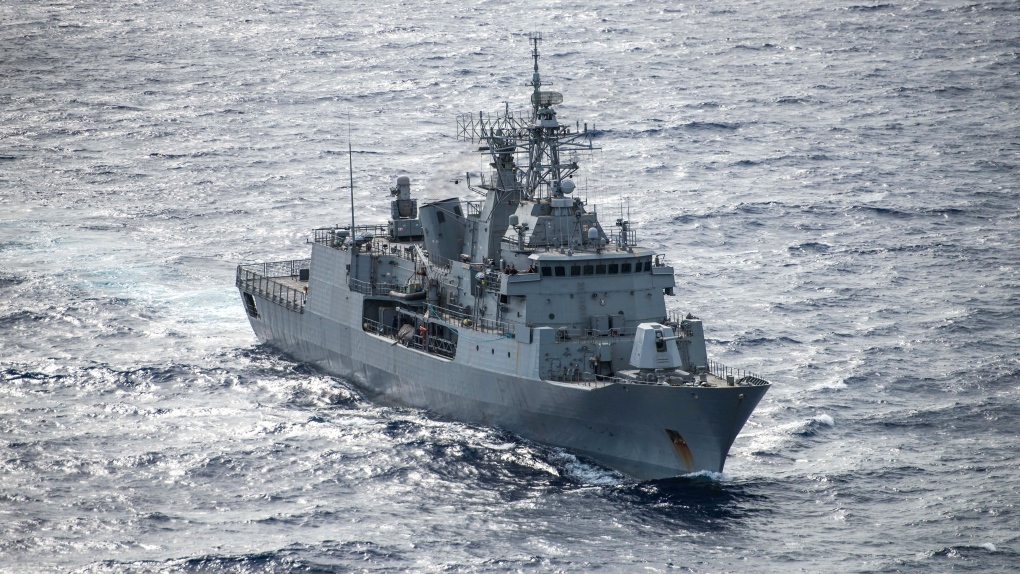Canadian national security concerns delay court battle over New Zealand warship upgrades
 Royal New Zealand Navy frigate Te Mana transits the Pacific Ocean on July 24, 2018. (U.S. Navy photo by Mass Communication Specialist 2nd Class Devin M. Langer)
Royal New Zealand Navy frigate Te Mana transits the Pacific Ocean on July 24, 2018. (U.S. Navy photo by Mass Communication Specialist 2nd Class Devin M. Langer)
A prolonged court battle over upgrades to a pair of New Zealand navy warships in Canada is now facing years of potential delays as the Attorney General of Canada reviews hundreds of thousands of documents in the case over national security concerns.
The New Zealand government inked a deal in 2014 with Lockheed Martin Canada to install new weapons and surveillance systems aboard Her Majesty's New Zealand ships Te Mana and Te Kaha. The two ships make up the entirety of the country's frigate fleet and the upgrades are intended to extend the life of the warships into the mid-2030s.
Lockheed subcontracted part of the work to Seaspan Shipyards in Victoria in 2018. But two years later, the shipyard filed a lawsuit against Lockheed in B.C. Supreme Court, alleging that problems with the company's designs had cost the shipyard more than $20 million in delays and workarounds on the first ship alone.
Lockheed responded with a counterclaim, alleging the delays were due to negligence, understaffing and mismanagement at the Victoria shipyard, and had set the company back tens of millions of dollars.
Both ships were due to return to New Zealand in 2020. The upgraded Te Kaha was returned in December 2020, nine months after its planned completion date, while the Te Mana remains in Victoria, more than eight years after the modernization contract was awarded.
200,000 PAGES, 'ONE HOUR PER PAGE'
In a decision published Thursday, a B.C. Supreme Court judge ordered an amended case plan to allow for delays as the attorney general's office reviews hundreds of thousands of pages of court submissions for potential redactions of sensitive national security information.
"The process often takes a number of years," judge Sandra Wilkinson wrote in her decision. "The COVID-19 pandemic has made examination of the documents by the relevant AGC [Attorney General of Canada] staff and agency members difficult, since the documents cannot be electronically transmitted and review must take place in person."
The review falls under Sec. 38 of the Canada Evidence Act, which prevents the disclosure in court of confidential information related to national security and international relations without the consent of the attorney general.
Minister of Justice and Attorney General David Lametti's office has "informed the court that initial review of each document [will] take one hour per page," Wilkinson wrote. "And there are approximately 200,000 pages to examine."
The attorney general has already confirmed that "a number of documents" provided for an initial review "contain injurious information," the judge wrote.
The documents in question are central to the legal claims of both Lockheed and Seaspan Victoria Shipyards, and both parties have been authorized to communicate directly with the attorney general on the Sec. 38 review, according to the court.
Wilkinson also directed the companies to provide quarterly updates on the review process beginning at the end of June.
CTVNews.ca Top Stories

Canadian gov't proposes new foreign influence registry as part of wide-spanning new bill
Prime Minister Justin Trudeau's government is proposing a suite of new measures and law changes aimed at countering foreign interference in Canada, amid extensive scrutiny over past meddling attempts and an ever-evolving threat landscape.
Boeing Starliner capsule's first crewed test flight postponed
The long-awaited first crewed test flight of Boeing's new Starliner space capsule was called off for at least 24 hours over a technical issue that launch teams were unable to resolve in time for the planned Monday night lift-off.
Teacher charged in historical sexual assault of Calgary teenage girl
Calgary police have charged a teacher with the alleged sexual assault of a teenage girl more than 20 years ago.
Winnipeg man admits to killing four women, argues he's not criminally responsible
Defence lawyers of Jeremy Skibicki have admitted in court the accused killed four Indigenous women, but argues he is not criminally responsible for the deaths by way of mental disorder – this latest development has triggered a judge-alone trial rather than a jury trial.
Man banned from owning animals after fatal Calgary dog attack
The owner of three Calgary dogs that got loose and mauled a woman to death in 2022 has been ordered to pay a $15,000 fine within one year and banned from owning any animal for 15 years.
East-end Ottawa family dealing with massive rat infestation
Residents in Ottawa’s Elmridge Gardens complex are dealing with a rat infestation that just won’t go away. Now, after doing everything they can to try to fix the issue, they are pleading with the city to step in and help.
Mediterranean staple may lower your risk of death from dementia, study finds
A daily spoonful of olive oil could lower your risk of dying from dementia, according to a new study by Harvard scientists.
An El Nino-less summer is coming. Here's what that could mean for Canada
As Canadians brace themselves for summer temperatures, forecasters say a weakening El Nino cycle doesn’t mean relief from the heat.
Newfoundland and Labrador latest province to tighten rules on Airbnbs
Newfoundland and Labrador is the latest jurisdiction to bring in stricter rules for short-term rentals, with a coming set of regulations that will force operators to register with the provincial government.

































